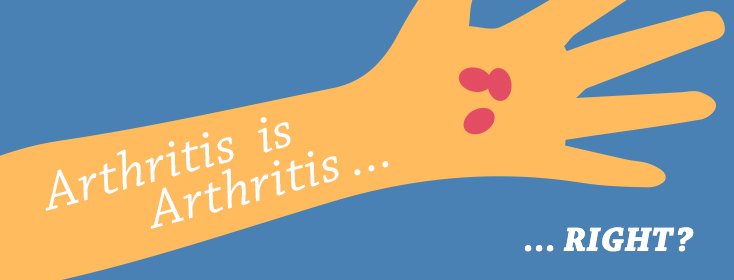Arthritis is Arthritis... Right?
I’ve had rheumatoid arthritis since I was 31 years old. The young internist who diagnosed me way back in 1987 said that that RA was an autoimmune disease. I had no idea what that meant, exactly, but I took it to be the reason I had arthritis without being old. I’d always thought it plagued the doddering elderly and no one else.
Mistaken beliefs and misconceptions around RA
Turns out, I wasn’t alone in this mistaken belief. “You’re too young to have that!” was the disbelieving response I got whenever someone asked me why my hand and wrist were wrapped in a compression bandage, or why I was limping and using a cane. The other stock response was “Oh, I have that in my knee/thumb/hip! I just take Tylenol for it.” Implicit in the remark was that I was being just a wee bit over-the-top, stumping along with a cane and all. Was I trolling for sympathy, or what? Ewww… !
When I tried to explain that Tylenol worked on rheumatoid arthritis about as well as a squirt gun would work on a barn fire, I’d get more disbelieving--or worse, pitying--looks. I was obviously a serious wimp and maybe even a hypochondriac. It wasn’t long before I was embarrassed every time I had a flare that caused me any degree of disablement. I went out of my way to hide it.
How to speak to others about RA
Since then I’ve learned a lot about RA and about osteoarthritis, the later-in-life kind of arthritis people mistakenly thought I was complaining about (and often still do). Today, when somebody asks me those questions, I have a far better answer.
Take arthritis out of the name
First, I tell them I have autoimmune rheumatoid disease. By taking the word “arthritis” out of the disease’s name, the listener doesn’t get a false impression of what it is. “Rheumatoid disease causes arthritis in the joints, among other things,” I say.
If the person I’m talking to says his grandad has that too, and he just takes Tylenol Arthritis for it, I shake my head.
“No, that’s a very different disease. That’s osteoarthritis. It makes the cartilage that cushions the joints wear down over time so that bone finally ends up rubbing on bone. It can be really painful, but Tylenol can often relieve it.
Describe the autoimmune response “Rheumatoid disease makes my body’s immune system attack its own tissues. It causes damaging inflammation all over the body, and arthritis in the joints. Pain relief? Well, heroin works pretty well.”That leaves my acquaintance either gaping at me or laughing at my “joke.” Unless they’re actually interested in finding out more--and they’re generally not--I change the subject and we move on.Explain with the differences between the twoThere’s plenty more I could say. Both diseases are incurable, but while osteoarthritis affects only the joints in the fingers, thumbs, the spine in the neck and lower back, the hips, knees, and feet, rheumatoid disease may affect every synovial joint in the body, including the jaw and in the voicebox. It may also cause terrible, disabling deformities in the joints.How does osteoarthritis differ from RA?I could say that while osteoarthritis breaks down the cartilage between the joints, rheumatoid disease breaks down cartilage, ligaments, tendons, the lining of the synovial capsule that surrounds the joint and the synovial fluid itself. It also attacks the linings of the heart and the lungs, and can attack the eyes, the vascular system, and the kidneys.Osteoarthritis is "wear and tear"Osteoarthritis is the most common form of arthritis in the U.S. It affects about 27 million adults age 25 and older, though it’s far more prevalent among people over 40. Researchers once believed that osteoarthritis was caused by the normal “wear and tear” the joints suffer over time, but more lately they’re coming to believe that it may be a disease process in itself. The pain osteoarthritis causes is frequently relieved by mild analgesics (like aspirin, ibuprofen, and Tylenol), and nonsteroidal anti-inflammatory drugs (NSAIDs), depending on the degree of damage in the joint and other factors.Rheumatoid arthritis is an autoimmune diseaseAutoimmune rheumatoid disease, still better known as rheumatoid arthritis, is much more rare, affecting just 1.5 million Americans over the age of 18. While it can affect children as young as toddlers, it generally affects people between the ages of 30 and 60. Among those with RD, women outnumber men three to one. Researchers believe the disease may be caused by some combination of genetics and environmental triggers, such as some viruses or smoking, but the exact cause is still unknown. And people with rheumatoid disease live shorter lives, on average, than those who don’t have it.It’s treated with NSAIDs and powerful drugs called disease modifying anti-rheumatic drugs (DMARDs), including one that was originally used to fight cancer, and biologic DMARDs. These drugs can’t cure the disease. Instead they may slow or stop its progression (known as remission). Over-the-counter analgesics may relieve the pain of mild RD/RA flares, but more severe flares often require stronger drugs, including NSAIDs and opioid pain relievers.And finally, people who have rheumatoid disease can have osteoarthritis, too--and vice versa.Arming myself with the facts helped me interact with othersIt’s good to know as much as we can about this disease, whether we call it rheumatoid arthritis or autoimmune rheumatoid disease. Age, experience, and finally arming myself with the facts have changed the way I think about the disease. They’ve also changed how I interact with others who don’t have it. I don’t feel insulted or embarrassed anymore. I just tell them how it is.Community Poll
What flare symptom do you wish you could avoid the most?

Join the conversation